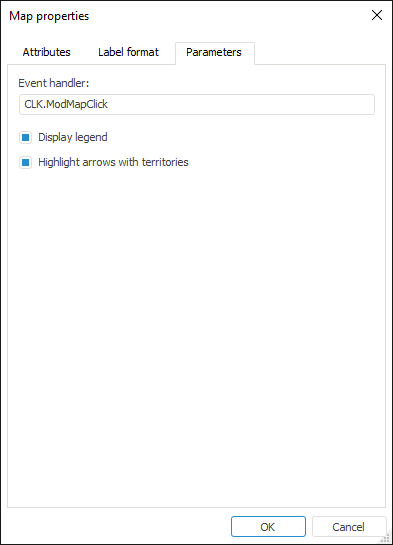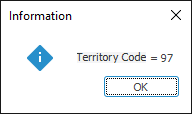To set up map event handlers, use the Parameters tab in the Map Properties dialog box.

In the Event Handler box specify name of the macro used for handling the event on the map territory click. The method of indicating path to the macro depends on the macro implementation location:
If the macro is implemented in a repository unit or form: <unit or form identifier>.<macro name>.
If the macro is implemented in one of the repository assembly objects: <assembly identifier>.<macro name>.
If the macro is implemented in one of the repository .NET assembly objects: <.NET assembly namespace>.<class name>.<macro name>.
In the units and forms of the repository, user macros are to be implemented in the global scope of names (Global Scope).
In .NET units and .NET forms of the repository, user macros are to be implemented within a class. The macro should be a static procedure or function.
NOTE. A development environment object that contains implementation of a macro is to be connected to a regular report.
To connect a macro to the chart, create a unit in the Object Navigator dialog box:
Sub ModMapClick(TerrId: Variant; Map: IPrxMap);
Begin
WinApplication.InformationBox("Territory code = " + (TerrId As Integer).ToString);
End Sub ModMapClick;
where TerrId - territory code; Map - the map itself.
To execute the example, add links to the Report and Ui system assemblies.
The corresponding Fore.NET handler looks as follows:
Imports Prognoz.Platform.Interop.Report;
Imports Prognoz.Platform.Forms.NET;
Imports Prognoz.Platform.Interop.Ui;
…
Public Shared Sub ModMapClick(TerrId: object; Map: IPrxMap);
Var
WinAppCls: WinApplicationClass = New WinApplicationClassClass();
Begin
WinAppCls.InformationBox("Territory code = " + (TerrId As integer).ToString(), Null);
End Sub ModMapClick;
Attach the created unit to the report. After attaching the unit, specify macro name in the Event Handler box on the Parameters tab of the Map Properties dialog box.
After attaching the macro, a message appears in case a territory in the map is addressed, such as:

See also:
Handling Report Events | Units: Report Units and Event Handling | Map Features in Regular Report